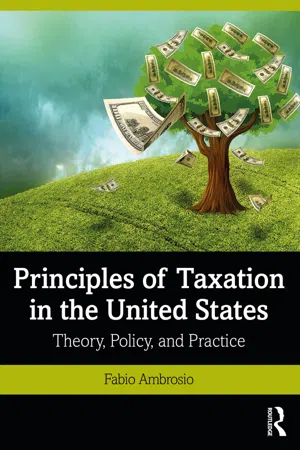
- 396 pages
- English
- ePUB (mobile friendly)
- Available on iOS & Android
About This Book
Taxation is a discipline that does not receive sufficient academic attention. It is typically viewed as a subset of law, accounting, public policy, economics, or finance. In this respect, most academic efforts in the field of taxation are shadowed by a mother discipline. There is currently an unprecedented need to approach tax pedagogy in a way that is independent of another discipline. This book caters to that real and unmet need in tax pedagogy.
One of the book's advantages is that it is not tied to a specific tax year and does not coddle the reader with volumes of time-sensitive information. In this book the tax year is never the focus, as the center stage is reserved for teaching the principles and skills necessary to independently find answers. The reader will learn to appreciate the complexity of the American tax system and will be endowed with the contextual understanding necessary to formulate educated opinions about how taxes work and, most importantly, why. Contrary to common belief, taxation in the United States has remained fairly stable for the last 100 years. This book uses the federal individual income tax as a vehicle to unveil the mechanics that make up the American tax system.
This book is essential reading for students taking a first course in taxation, at the undergraduate or graduate level, as part of programs in accounting, law, public administration, or business at large.
Frequently asked questions
Chapter 1
A historical perspective on tax policy
Philosophical notions of taxation

| Dialogue | Notes |
King Frederick: “Give me your opinions on taxation.” | Notice that Casanova lists taxes on the basis of their purpose. In his mind, the ends of a tax justify the means. It was rather bold for him to define the royal tax as ruinous in front of a king! |
Casanova: “There are three kinds of taxes, considered as to their effects. The first is ruinous, the second a necessary evil, and the third invariably beneficial … The ruinous impost is the royal tax, the necessary is the military, and the beneficial is the popular. … The royal tax, sire, is that which deplenishes the purses of the subject to fill the coffers of the king.” | Casanova understood that taxes, the economy, and commerce are tightly knit. More taxes tend to slow the economy, and this remains true today. |
King Frederick: “And that kind of tax is always ruinous, you think.” | |
Casanova: “Always, sire; it prevents the circulation of money — the soul of commerce and the mainstay of the state.” | |
King Frederick: “But if ... |
Table of contents
- Cover
- Half Title
- Endorsements
- Title Page
- Copyright Page
- Dedication
- Contents
- Detailed contents
- List of figures
- List of images
- List of tables
- About the author
- Foreword
- Preface
- Part I Conceptual foundations
- Part II The underpinnings of tax in the United States
- Part III The mechanics of an American individual income tax return
- Part IV Reflections on policy and practice
- Appendices
- Index